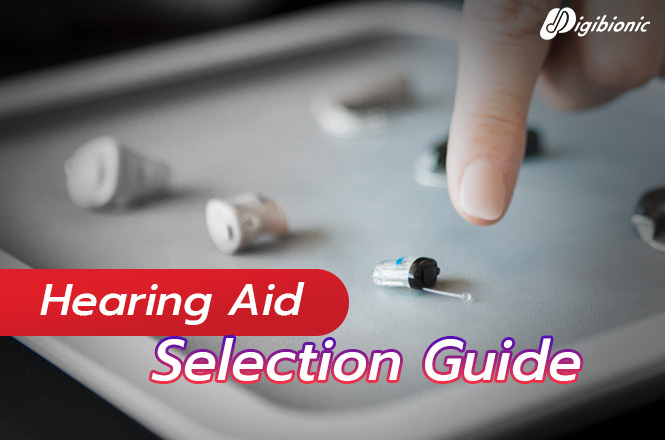
Hearing aids are the most commonly used devices for individuals with hearing loss. Therefore, choosing the right hearing aid is the most crucial factor in determining user satisfaction. However, with so many types available on the market, first-time users often find it overwhelming and don’t know which model suits them best. Digibionic recommends evaluating your needs from the following aspects to find the most suitable hearing aid for you.
1. Understand the level and cause of your hearing loss
It is highly recommended that individuals with hearing loss undergo a hearing test before selecting a hearing aid. Different degrees and causes of hearing loss affect the choice and performance of hearing aids. Many first-time users focus only on the aesthetic design, overlooking that a device that’s too small might not provide adequate amplification, leading to poor results after purchase. Moreover, certain types of hearing loss are not suitable for hearing aids or may require specific functions or accessories to achieve optimal support. Therefore, a professional hearing test is essential before making a decision.
2. Evaluate your lifestyle
Your daily lifestyle and interests play a significant role in choosing the right hearing aid. For example, individuals who are socially active and frequently converse in different environments may need a hearing aid with advanced sound processing and environmental analysis features. Those who often watch TV or listen to music on their phones might consider hearing aids with Bluetooth streaming capability. Since hearing aids are worn throughout the day, your lifestyle should be a primary factor when selecting the most suitable model.

3. Choose the right features
Hearing aid technology is constantly evolving, offering a variety of functions to meet different listening needs. For example, directional microphones can improve hearing in noisy environments; rechargeable functions offer convenience; and wind noise reduction helps ensure comfort outdoors. Binaural synchronization enhances the benefits of natural two-ear hearing. It’s recommended to evaluate your lifestyle and listening needs carefully, then select functions that suit you. You can also test these features in real-life situations to find what works best.
4. Choose the right hearing aid style
Appearance is often an important factor when choosing a hearing aid. Some people with hearing loss even avoid wearing hearing aids because of how they look. However, untreated hearing loss increases the risk of dementia and social isolation, leading to missed moments of connection and happiness. Seeing today’s younger generation confidently wear Bluetooth earbuds can inspire a more positive perception toward wearing hearing aids.
Modern hearing aids now come in a variety of stylish designs and colors. While aesthetics are important, it’s best to first consider the other factors mentioned—hearing level, lifestyle, and functionality—before deciding on the look. Choosing a hearing aid solely based on appearance might result in poor performance and neglect of hearing needs.
5. Visit a professional hearing care center
Professional audiologists can provide accurate hearing assessments and recommend the most suitable options based on your individual hearing condition. They also ensure that your hearing aid settings are optimized for your specific needs. Equally important is the after-sales service, which guarantees proper follow-up care and adjustments after your purchase.
Studies have shown that hearing aids can significantly improve the quality of life for individuals with hearing loss. With today’s advanced technology, user satisfaction continues to rise. The key is to address hearing loss as early as possible—waiting too long may reduce the effectiveness of hearing aids.
Therefore, we recommend that you first assess your level and cause of hearing loss, understand your lifestyle, and choose hearing aid features that match it. Then, with professional guidance, find the style and color you like best. This approach ensures you select the hearing aid that truly suits your needs and enhances your hearing experience.
เราใช้คุกกี้เพื่อพัฒนาประสิทธิภาพ และประสบการณ์ที่ดีในการใช้เว็บไซต์ของคุณ คุณสามารถศึกษารายละเอียดได้ที่ นโยบายความเป็นส่วนตัว และสามารถจัดการความเป็นส่วนตัวเองได้ของคุณได้เองโดยคลิกที่ ตั้งค่า